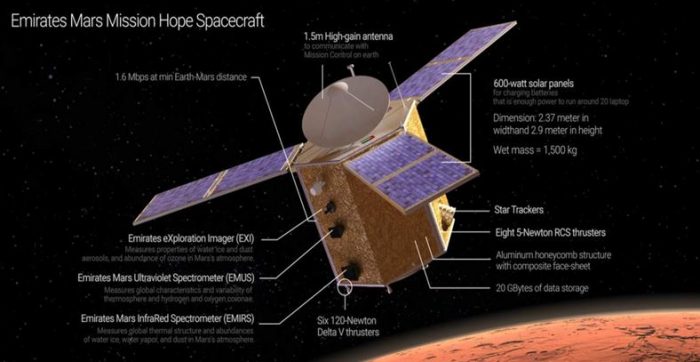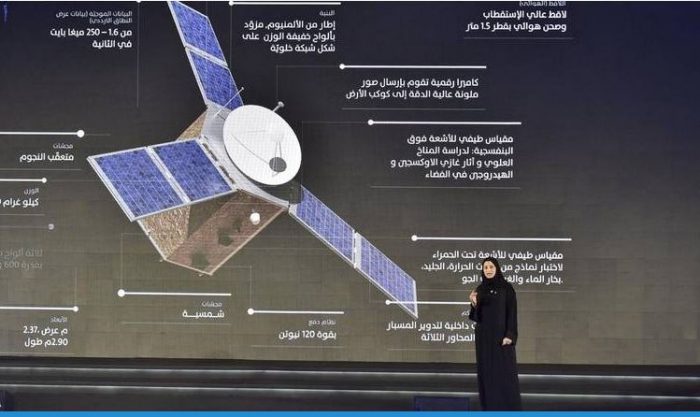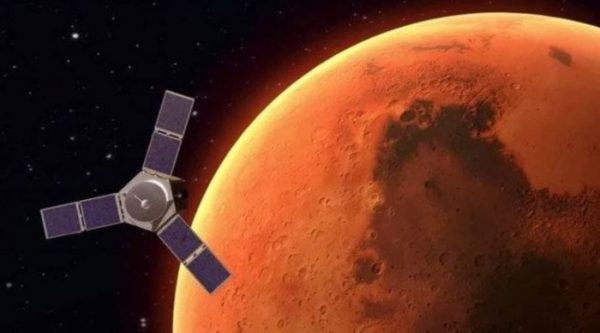Colossal skyscrapers, innovative technologies, and mega-projects have always put the UAE on the world map. Now it is about to set yet another record by launching its first space mission.
The first Arab space mission to Mars from the United Arab Emirates (UAE) is preparing for its imminent liftoff. The mission will take seven months to make the 493 million-kilometer journey to Mars, where it will function as an orbiter to collect scientific data on the Red Planet. Officials say the project is designed to inspire the region’s youth and pave the way for scientific breakthroughs.

The mission, called Amal (“Hope” in Arabic) will send back data about the Red Planet’s climate and atmosphere. The probe is designed to stay in Mars’ orbit for 687 days – roughly one Martian year. It is to blast off from a Japanese space center on July 15, with preparations now in their final stages.
Reports from various sources mention that the mission has been in preparation by the UAE since 2014.
Since UAE does not have a launch pad to support the mission, the space agency will use the rocket shipped from Japan. The fueling of the spacecraft that will travel to Mars will commence its operations, will begin next week.
The robotic craft is scheduled for launch from the Japanese island of Tanegashima on 14 July 2020. The Hope Mars mission is expected to reach the red planet by February 2021. It will take seven months to travel the 493 million km (308 million miles) to reach Mars and begin its orbit, sending back ground-breaking new data about its climate and atmosphere. A single orbit around Mars will take the probe 55 hours. The probe will remain orbiting Mars for an entire Martian year, 687 days, to gather sufficient data.
Omran Sharaf, project manager of the Amal mission, said that the mission is integral to the country’s long-term economic development. He added, “It is about the future of the UAE and our survival.”
“The UAE wanted to send a strong message to the Arab youth and to remind them of the past, that we used to be generators of knowledge,” he told the press.
“People of different backgrounds and religions coexisted and shared a similar identity. Put your differences aside, focus on building the region, you have a rich history and you can do much more, ” he said of the Arab world, now fractured with many countries locked in turmoil.
Sarah bint Yousif Al Amiri, the UAE Minister of State for Advanced Sciences and the mission’s deputy project manager said it was imperative that the project has a long-term scientific impact.
“It is not a short-lived mission, but rather one that continues throughout the years and produces valuable scientific findings – be it by researchers in the UAE or globally,” she told

She then explained that the probe will provide a comprehensive image of the weather dynamics in Mars’ atmosphere with the use of three scientific instruments.
- An infra-red spectrometer will measure the planet’s lower atmosphere and analyze the temperature structure.
- A high-resolution imager will provide information about the ozone; and a third, an ultraviolet spectrometer to measure oxygen and hydrogen levels from a distance of up to 43,000 kilometers from the surface.
- An ultraviolet spectrometer will measure oxygen and hydrogen levels.
The tools will allow researchers to observe the Red Planet at all times of the day and observe all of Mars during those different times.
The UAE sent its first astronaut into space last year and is also planning to build a ‘Science City’ to replicate conditions on Mars, where it hopes to build a human settlement by 2117.
UAE project leaders working on the mission have reminded the world that, eight centuries ago, Arab inventors and intellectuals were right at the forefront of scientific discovery.
So today, the ruler of Dubai, one of the seven emirates that make up the UAE, is hoping this ambitious project will rekindle a sense of cultural pride and help the region to diversify away from its dependence on the oil industry.




![The Top & Most Popular Seafood Bucket Restaurants in Dubai for you [Never Miss]](https://uae24x7.com/wp-content/uploads/2020/09/8-seafood-in-a-bucket-scaled-e1600739237403.jpg)
![Procedures for Renewing the Driving License in Abu Dhabi [3 Simple Steps]](https://uae24x7.com/wp-content/uploads/2020/07/Capture-9-e1595666454466.jpg)





